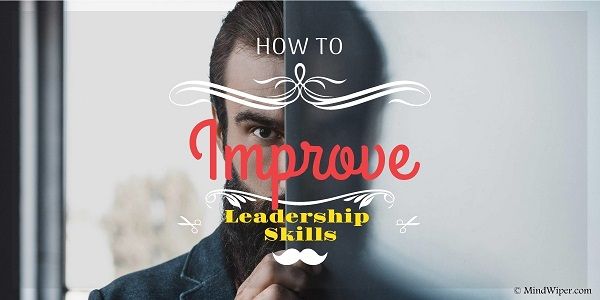Improving leadership skills is a practice to make it a ritual. If you really want to know how to improve leadership skills; start identifying your areas of improvement, analyze yourself, evaluate your past mistakes, plan strategically, act upon the plan, practice it, and make it a habit.
Leaders have a habit to make habits. Improving leadership skill is a part of the skill a leader should have, leaders, are the perpetual student of life. The more a leader experiences, the more he or she is learning. Learning more, taking responsibility and analyzing own skills can help to improve leadership skills.
How to Improve Leadership Skills?
Here in this article, we will discuss top ten tactics to improve leadership skills
1. Analyze Your Experience as a Leader
As an experienced leader, you must have faced many challenges, handled conflicts, influenced people and executed goals. Here are the few questions worth mentioning a leader should ask oneself to analyze his experience
- Is it my personal power that has influenced the people? Is it my positional power that has influenced the people?
- What are the mistakes I have made? Why are the reasons for these mistakes? Are these because of my fault or fault of my subordinates? Did I make mistake while delegating the tasks? Did I make mistake while analyzing strengths of my subordinates? Are there any changes necessary?
- Have I made a leader of leading people? Are the leaders I trained competent enough?
- Where is the opportunity to grow? Are the opportunities feasible enough? Do I need a strategic change? Which strategy is best to do?
2. Identify Areas of Improvement
After the analysis, you will find the list of skills, strategies, and techniques that are hampering the progress, here are a few steps to improvement
- List the skills, strategies, organization structure, delegation to improve
- Find the optimum solution, change the strategies
- Analyze, brainstorm, review new strategies, ideas, and skills you are going to improve
- Take action to improve what you have decided to change
3. Push Away The Trivial
As a leader, you may have faced failure, ineffectiveness or inefficiency due to strategies, skills, manpower, or because of your own fault. Discard the negative, ineffective, and inefficient skills/thought, or strategies to develop a newer one, but make sure that you have taken calculated conscious decision to push away what is negative, trivial and unnecessary.
4. Learn From The Past
Leaders don’t repeat the same mistake again, so be careful with the mistakes, know the reason for mistakes and keep it focused while taking a decision. For a leader, learning from the past means cultivating wisdom through experience, expertise, and knowledge.
To learn from past; find out the reasons for failure, list down the reasons, understand the reason for failure, find a solution, change strategies, take others’ opinion and take conscious action.
5. Develop Strategic Leadership Skills
Strategic Leadership is about having an influence on personal power to create a progressively advancing community towards a common purpose. As a strategic leader, you have to develop new leaders who can create leading people.
You can grow only when you let others grow, you can influence anyone through your personal power, don’t influence through position power. No need to mention what people say about the leader who uses positional powers to influence people. These kinds of leadership are temporary; when the position goes away, and influence goes away.
As an organization to grow, a leader has to involve the group of the leader towards a common purpose; identify, explain, and motivate your subordinates with a common purpose. Leaders don’t drive people, they inspire people, and your subordinates have to feel that the goal is not yours, it is their goal.
6. Develop Critical Thinking
Critical thinking is the key to problem-solving skill; problem grows along with time, experience, position and responsibility. Critical thinking involves utilization of cognitive skill, rational thinking, creative thinking and problem-solving skill. Start developing these skills, practice it, and make it a habit.
Turn your critical thinking into a habit, habit takes reflex action, it saves precious time. As a leader, you have to be quick & effective enough take a conscious decision. Scientist proved that it takes 66 days of practice to make a habit. So, practice critical thinking, it will become a habit.
For example, when you are learning to drive, try to remember those days, you might have to tell your leg or hand to push brake or accelerator, but over a period of time, you practiced it. Do you need to tell your leg or hand to do these things now? It happens automatically right, now you don’t need to utilize your conscious power as earlier.
7. Be a Good Listener
Being a good orator can inspire others, influence others, or manage others. But as a leader, you have to identify the potential and strengths of your team member, you have to convince them. In the case of handling clients, you have to convince your clients; make them valuable and inspire them.
Being a good listener, you can know the need, expectation & concern of your clients, the better you know your client, the better you can convince them. Similarly, by listening to your subordinates, you can connect with their strengths, potentials, need, expectation, and concern, and then you can motivate your subordinates in a better way.
8. Improve Personal Power
As already mentioned, to be a strategic leader, you will need personal power. Nobody can take away your personal power, but position power is an illusion of time & situation, it goes away with time. So what are the personal powers?
Here are the few examples of personal power – ability to inspire others, ability to motivate others, ability to set oneself a role model for others, ability to understand others, ability to convince others, ability to recognize people & their strengths, ability to delegate tasks according to strengths & priority and ability to practice self-discipline
9. Delegate and Motivate Others
Greatest leaders have admitted that they rose to the top because another leader recognized and harnessed their potential. The greatest leaders are those who include everyone in their sphere of influence by recognizing each person’s greatest virtue.
Start identifying strengths, weakness, skills, and passion of your subordinates, delegate tasks according to their potential. Recognize their value and recognize their source of motivation.
For example in an organization, employees find values in promotion, recognition, passion, commitment, appreciation and financial increment. Find the source of motivation of your subordinates or employees, involve them, and give them the value they want.
10. Keep Learning
Be receptive to everyone’s perceptions, information, knowledge, and wisdom around the world.
Pay attention to what others say, involve them, recognize them, accept your weakness and let others contribute to your goal. Never stop learning, never act like you know everything.
Learning enhances personal power, reasoning capability, analytical capability, execution skill and most importantly your wisdom.
Always keep in mind that we all humans are the perpetual student of the treasure of this universe; keep exploring possibilities, ideas, knowledge, wisdom, and never give up.

Ashim, the Founder of MindWiper, loves to learn, share, and educate various dimensions of life skills development. After graduating with an engineering degree, he worked with major ICT industries in India and finally he followed his dream to integrate technology for Cognitive Skills & Life Skills Development.

